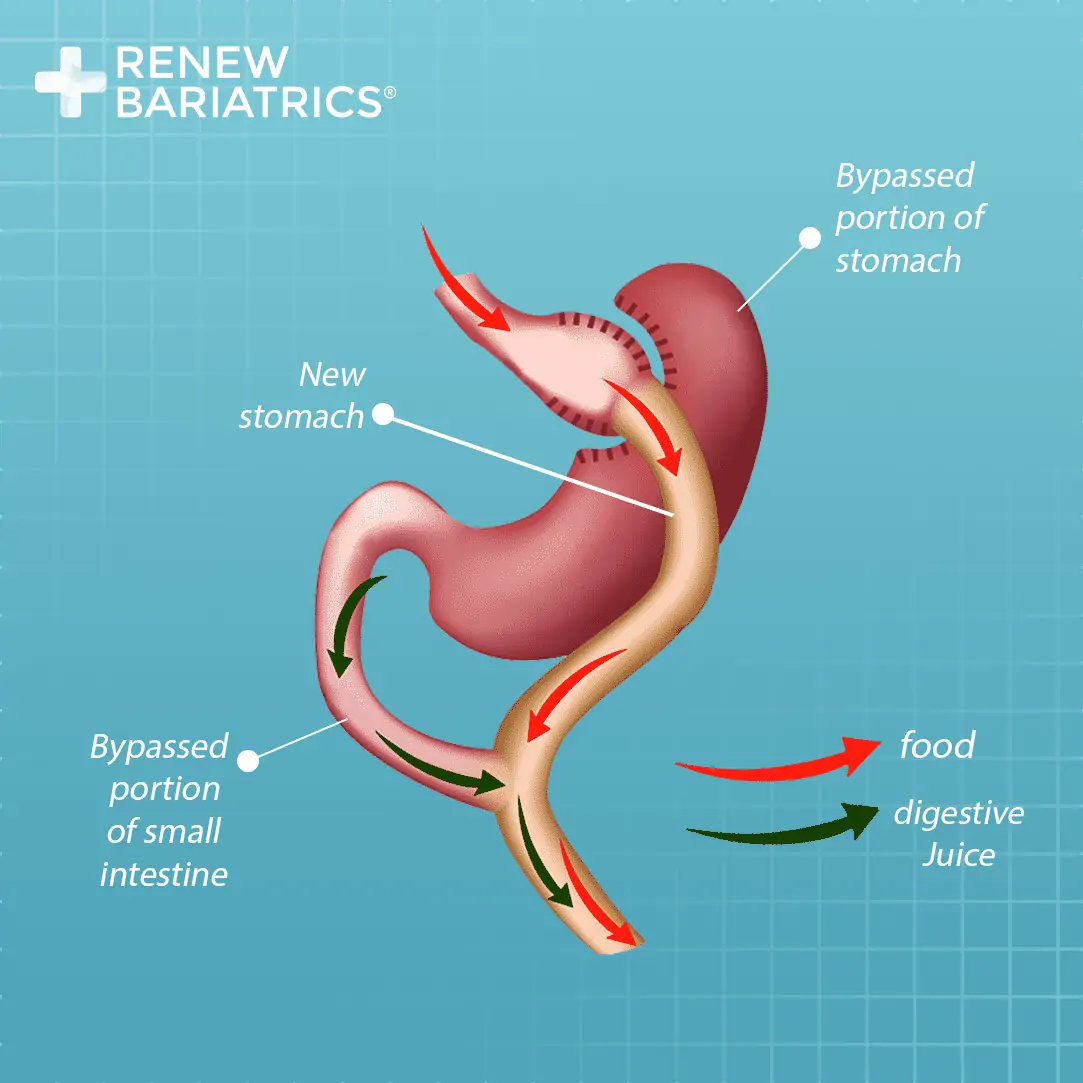Single Anastomosis Bypass in Mexico
Felicia
Lost 107 lbs


Robbalee
Lost 270 lbs


Mini Gastric Bypass Surgery in Mexico is an ideal option for those seeking higher levels of expected weight loss, compared with other bariatric procedures.
Choosing Mexico to undergo surgery is a smart choice those seeking quality, affordable bariatric care.
Renew Bariatric Advantages on the Mini Gastric Bypass:
Renew Bariatrics, a leading weight loss surgery center in Tijuana, offers all-inclusive surgical packages on the mini gastric bypass surgery, as well as, revisional surgeries.
Gastrointestinal weight loss surgery, particularly gastric bypass surgery, is a very effective long-term treatment for weight gain and obesity. According to studies, patients lose an average of 60% – 75% of excess weight after the operation. They also manage to maintain more than 50% excess body weight loss for not less than 15 years.
Mini gastric bypass surgery is one of the latest procedures in the field. Let’s look at what it is, who qualifies for it, and how much weight you should expect to lose after the procedure.
Mini gastric bypass surgery works similarly to Roux-en-Y gastric bypass surgery (RYGB). It is also referred to as single anastomosis gastric bypass surgery. It aims to help the patient lose weight, albeit through a simpler technique that takes less time to perform.
Mini gastric bypass surgery combines the techniques of gastric bypass and gastric sleeve surgeries.
During mini gastric bypass surgery, the surgeon makes the patient’s stomach smaller by dividing it into two unequal portions using surgical staples. The smaller portion takes about 25% of the original size and is connected to the rest of the digestive tract. The remaining bigger portion stays unutilized.
The surgeon also bypasses a large portion of the small intestine with minimal surgical rerouting compared to traditional gastric bypass surgery.
Since the operation combines restriction with malabsorption, it provides better weight loss and quality of life.

Candidates eligible for mini gastric bypass surgery must satisfy the following requirements:
Patients with lower BMI but chronic obesity-related illnesses may also be candidates.
A mini gastric bypass, particularly when performed as a mini gastric bypass in Tijuana, works through both restrictive and malabsorptive techniques.
Through restriction, a key feature of the mini gastric bypass surgery, the patient’s stomach is made smaller. This means they can’t eat as much as before the surgery, which contributes to the mini gastric bypass weight loss rate. They also feel fuller quicker and longer, a benefit that drives many to consider the mini gastric bypass cost in Tijuana, Mexico.
The malabsorptive aspect of the surgery, a common technique in Mexico mini gastric bypass surgery, involves the rerouting of the small intestine. This rerouting causes the digested food to have less contact time in the tract, thus inhibiting the body from extracting all nutrients and calories from the food before it becomes waste, which is a distinction when comparing mini gastric bypass vs gastric bypass.
By inhibiting how much you’re eating and how much calories your body can absorb, the mini gastric bypass in Mexico—often sought after for its effectiveness and affordability—helps you lose significant weight.
The Mini Gastric Bypass Surgery at Renew Bariatrics is a testament to our high standard of medical excellence in Tijuana, Mexico. By utilizing minimally invasive techniques, our patients benefit from reduced recovery times and lower risks of complications. Our skilled surgeons and state-of-the-art facilities ensure that the journey towards a healthier life is both effective and affordable. Discover the advantages of our approach and how it can lead to significant and sustainable weight loss.
Mini gastric bypass surgery, often sought after for the competitive mini gastric bypass cost in Tijuana, Mexico, is performed using a laparoscope under general anesthesia. The surgeon typically uses five incisions on the abdomen, which act as access points to insert the special surgical instruments necessary for the mini gastric bypass in Tijuana.
These instruments allow the surgeon to staple the top portion of the stomach, effectively separating the stomach into two sections. The smaller section is then shaped into a tube, becoming the new, functional stomach for the patient. This technique is a hallmark of the mini gastric bypass in Mexico and contributes to the mini gastric bypass weight loss rate.
Finally, the surgeon reroutes a portion of the small intestine and connects it to the new stomach, which is a less invasive process compared to the traditional gastric bypass surgery often performed in Mexico mini gastric bypass surgery centers. Unlike the traditional gastric bypass, where the larger remaining stomach may be removed, in Tijuana mini gastric bypass surgery, the remainder of the stomach is left in place but is no longer involved in the digestive process.
Within 12 to 24 months of mini gastric bypass surgery, you can lose anywhere between 30% to 40% of your total body weight. This translates to about 70% excess body weight over a 12 to 18-month period.
The initial weight loss is similar to gastric bypass patients. However, patients who’ve undergone mini gastric bypass surgery lose more weight collectively by the two-year mark.
Mini gastric bypass surgery has the following pros or advantages:
Although rare, single anastomosis bypass surgery carries the following cons or disadvantages:
You can know if mini gastric bypass surgery is right for you by contacting a qualified bariatric surgeon today. They can provide information on the procedure, including the mini gastric bypass cost in Tijuana, Mexico, and what to expect in terms of results and recovery.
At Renew Bariatrics, we prioritize informed decisions. Our qualified bariatric surgeons in Tijuana are readily available to discuss the Mini Gastric Bypass procedure, providing insights into the cost, benefits, and recovery process in Tijuana, Mexico. We encourage prospective patients to reach out and learn how our personalized approach to bariatric surgery can align with their health goals and financial considerations. Let us guide you towards making the choice that best suits your journey to health and wellness.

Meet Dr. Héctor Joaquín Pérez Corzo a board-certified bariatric surgeon based in Tijuana and Cancun, Mexico. Dr. Perez has over 11 years of bariatric surgery experience.

Dr. Rene Armenta is a skilled bariatric surgeon who has performed thousands of bariatric surgeons including revisional and gastric bypass revisional surgeries.

Dr. Jorge Green is premier bariatric surgeon practicing in Tijuana, Mexico. Dr. Jorge Green is a leading weight-loss surgeon who has performed more than 1,000+ bariatric surgeries.






Frequently asked questions by those interested mini gastric bypass surgery.
In proximal Roux-en-Y gastric bypass surgery, the stomach size is reduced by the creation of a pouch of about 30mls from the upper part of the stomach with the use of staples. The small bowel is then divided at about 45cm from the stomach with the distal end connected to the pouch and the proximal end to the small bowel at about 145cm from the stomach. Thus two areas of anastomoses are created; the gastrojejunostomy and the jejunojejunostomy.
In MGB surgery, the stomach is divided to create a tubular pouch that is similar to that of a gastric sleeve. The surgeon then takes a loop of the small bowel at about 2m (6-7feet) from the stomach and join (anastomose) it to the tubular pouch. By this, the food bypasses about 2m of the small intestine.
Ready for Mini Gastric Bypass in Mexico? Learn more about this great bariatric option from our highly educated bariatric coordinators. Weight Loss Surgery in Tijuana is a viable option for those who lack insurance or who don’t have the cash to self-pay in the US.
The mechanism of weight loss after the mini gastric bypass is similar to that of Roux-en-Y gastric bypass. The stomach pouch accommodates the only small quantity of food leading to calorie restriction. The food avoids 6-7 feet of the small intestine where most of the absorption takes place resulting in malabsorption.
Many studies have shown that MGB has similar efficacy with RYGB in terms of weight loss and resolution of comorbid conditions while others revealed that MBG is more efficient than RYGB. This is in addition to other benefits such as: reduce the time of surgery, shorter learning curve, and lesser major complications. Five years after surgery, the percentage excess weight loss for MGB was 72.9% and BMI of 27.7kg/m2. These were better than percentage excess weight loss of 60.1% and BMI of 29.2kg/m2 recorded for patients with RYGB. This finding is also similar to that of Lee et al. where the percentage excess weight loss was greater in MGB group than in RYGB group one year post-surgery 64.9% vs. 58.7%. However, not much difference was observed 2 years post-surgery. Remission of type 2 diabetes mellitus was also better in patients who had MGB surgery as compared to RYGB and gastric sleeve surgeries.
Complications of MBG are not much different from those of RYGB. The complication rate for MGB surgery was found to be lower (7.5%) when compared with that of RYGB surgery with a complication rate of 20%.3Other potential complications that are worthy of mention are as follow:
In conclusion, mini gastric bypass surgery is an effective bariatric surgery combining both restrictive and malabsorptive mechanisms to induce weight loss. Though there has been a growing concern among few surgeons on the risk of gastric and esophageal cancer following this procedure, this has not been supported by any tangible evidence.
Copyright © 2023 Renew Bariatrics, Inc.
“Individual results are not guaranteed and may vary, please refer to our disclaimer page. This content is not intended to be a substitute for professional medical advice, diagnosis, or treatment. Always seek the advice of your physician or another qualified health provider.”
“Renew Bariatrics, Inc. is a medical tourism scheduling facilitator, not a healthcare provider.”